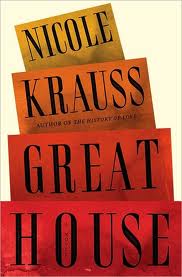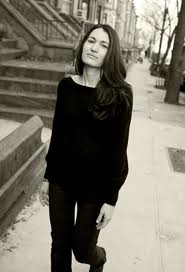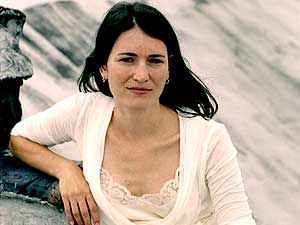A thirteenth century Jewish mystic, Azriel of Gerona, added the following to the essential writings of the Kaballah: “If you dare to contemplate that to which thought cannot expand and ascend, you will not escape one of two consequences. From forcing thought to grasp that which cannot be comprehended, your soul will ascend, be severed, and return to her root, or else your mind will become confused.”
 Nicole Krauss’ virtuosic third novel Great House both tempts the reader to contemplate a great mystery and carries the reader to the very brink of confusion in the tradition of Jewish mysticism. In this sense, there is a wise didactic impulse at work here. She artfully engages us in tracking the novel’s embedded clues and feints. But the more enduring pleasures of Great House arise from the moving lyricism of her characters’ narratives.
Nicole Krauss’ virtuosic third novel Great House both tempts the reader to contemplate a great mystery and carries the reader to the very brink of confusion in the tradition of Jewish mysticism. In this sense, there is a wise didactic impulse at work here. She artfully engages us in tracking the novel’s embedded clues and feints. But the more enduring pleasures of Great House arise from the moving lyricism of her characters’ narratives.
Simmering in the background is the pernicious persistence of history: the Jewish Holocaust, the Chilean atrocities of Pinochet, the Arab-Israeli conflict. The situations of Krauss’ characters are implacably driven not only by past damages, but also by the limitations of their understanding. So who are they? The story begins in 1972. A novelist in New York receives the gift of a massive desk from a lover, a young poet named Daniel Varsky who departs for and dies in Chile. The desk may or may not have belonged at one time to Lorca. Years later a person claiming to be his daughter visits the novelist and takes possession of her father’s desk.
From here, Krauss introduces several more characters. In Jerusalem, a father narrates the story of his long antagonistic relationship with his son who returns from England after the death of his mother. In London, a writer named Lotte Berg is visited by Daniel Varsky; her story is narrated by her husband who describes the huge desk she owned: “drawers of impractical sizes, like the desk of a medieval sorcerer.” The Nazis had forced Lotte and her parents from their house in Nuremberg; ultimately she made her way to England via a kindertransport from Poland. Then there is George Weisz, driven from Budapest by the Gestapo in 1944, now an expert in locating lost heirlooms for clients around the world.
 As the characters tell their stories, one notices that Krauss stylizes the rhythms and manners of their speeches almost identically. They are all extremely fluent with memory and articulate about the turn of thought in the mind, the shift from confidence to fear to hesitation to assertion. One is reminded of the long, meditative and descriptive lines of Sebald. The emotional content of their testimonies is integrated through a near uniformity of expression. Thus, everything points back to an unnamed organizing intelligence or force — yet the technique is not so intrusive as merely to reflect credit on the writer herself. (Great House is essentially a novel of memory applied to an uncertain but overwhelming need. It seems to ask: what is the purpose of recollection?)
As the characters tell their stories, one notices that Krauss stylizes the rhythms and manners of their speeches almost identically. They are all extremely fluent with memory and articulate about the turn of thought in the mind, the shift from confidence to fear to hesitation to assertion. One is reminded of the long, meditative and descriptive lines of Sebald. The emotional content of their testimonies is integrated through a near uniformity of expression. Thus, everything points back to an unnamed organizing intelligence or force — yet the technique is not so intrusive as merely to reflect credit on the writer herself. (Great House is essentially a novel of memory applied to an uncertain but overwhelming need. It seems to ask: what is the purpose of recollection?)
Writing about the characters in García Márquez’s One Hundred Years of Solitude, Milan Kundera says, “The center of attention is no longer an individual but a procession of individuals; they are each original, inimitable, and yet each of them is merely the brief flash of a sunbeam on the swell of a river … and each is conscious of that , none of them remains on the novel’s stage from beginning to end.” The levitated passage of the somewhat sinister but magisterial desk may suggest the magical realism of Márquez, and Kundera’s remark certainly pertains to Great House — but the novel is more darkly colored by the Judeo-European modernisms of the 20th century.
 Taken together, the narrations form a long and rueful refrain. But as Kundera notes of Márquez, each is “original, inimitable.” When we first hear about Lotte Berg, her husband Arthur says, “In some fundamental way I think she objected to being known … I wanted, or I thought I wanted, to force her to do what I was convinced she longed for, to realize her desires instead of harboring them in secret, and to deliver us both to the terrible consequences that would follow. Though the truth was that all I was really searching for was that she wanted only me.” Great House powerfully expresses the chilling fact – makes you feel the sensation – that our lives, lived in secret, are punctuated but not actually changed by self-knowledge, which we must accept as its own inconsolable reward.
Taken together, the narrations form a long and rueful refrain. But as Kundera notes of Márquez, each is “original, inimitable.” When we first hear about Lotte Berg, her husband Arthur says, “In some fundamental way I think she objected to being known … I wanted, or I thought I wanted, to force her to do what I was convinced she longed for, to realize her desires instead of harboring them in secret, and to deliver us both to the terrible consequences that would follow. Though the truth was that all I was really searching for was that she wanted only me.” Great House powerfully expresses the chilling fact – makes you feel the sensation – that our lives, lived in secret, are punctuated but not actually changed by self-knowledge, which we must accept as its own inconsolable reward.
Arthur returns toward the end of the novel to narrate “the terrible consequences” in the days after Lotte’s death. Let me quote at length to give a taste of Krauss’ prose:
“What right do I have to turn over a stone she wishes to leave unturned? It was then that the sense rose up in me like bile, a sense I tried but failed to keep down, that what I was really doing was trying to expose her guilt. To expose it against her wishes, in order to punish her. For what, you might ask, punish the poor woman for what? And the answer that comes to me, which is only part of the answer, is that I wished to punish her for intolerable stoicism, which made it impossible for me to ever be truly needed by her in the most profound ways a person can need another, a need that often goes by the name of love. Of course she needed me – to keep order, to remember the shopping, to pay the bills, to keep her company, to give her pleasure, and, in the end, to bathe, and wipe, and dress her, to bring her to the hospital, and finally to bury her. But that she needed it to be me who performed these duties and not some other man, equally in love with her, equally at the ready, was never entirely clear to me. I suppose it could be said that I never demanded that she make the case for her love, but then I never really felt I had the right. Or maybe I feared that, honest as she was, unable to tolerate the smallest insincerity, she would fail to make the case, that she would stutter and grow silent, and then what choice would I have but to get up and leave forever, or continue with things as they had always been, only now with the fully knowledge that I as simply one example where there could have been many?”
 The repetitions of Great House usually serve the effect of indicating the limits of character, though sometimes there are just too many words. Also, Krauss is operating a shell game between the twists of recalled action and the enticements of a potentially discovered secret – a game that at times may seem more precocious than subtly ingenious. But if Krauss dares us to grope in the murk, she has also dared herself to risk the failure of a too ornate design.
The repetitions of Great House usually serve the effect of indicating the limits of character, though sometimes there are just too many words. Also, Krauss is operating a shell game between the twists of recalled action and the enticements of a potentially discovered secret – a game that at times may seem more precocious than subtly ingenious. But if Krauss dares us to grope in the murk, she has also dared herself to risk the failure of a too ornate design.
Nadia, the novelist of the first chapter, suffers a lapse of confidence in her work. She disparages herself as “someone who made use of the pain of others for her own ends, who, while others suffered, starved, and were tormented, hid herself safely away and prided herself on her special perceptiveness and sensitivity to the symmetry buried below things … a fraud who hid a poverty of spirit behind a mountain of words.”
This is how Krauss lets us know that she wishes to be tested by our reading of Great House. But in turn, she demands the right to lead the reader to the lesson of her novel’s form — and its place among the tradition of the mystics. It is a right she has worked both sincerely and cleverly to deserve.
[Published by W.W.Norton on October 12, 2010. 289 pages, $24.95 hardcover]
Listen to an interview with Nicole Krauss on KQED.